Open Access
Review
by
Liu Hanxiang
, Yijia Li
, Huixian Zhou
, Yixin Yang
, Rongkai Yan
, Xiaofeng Zhang
, Yutong Miao
, Siyuan Song
and
Lingyu Bao
AI Med 2025 1(2):6; 10.71423/aimed.20250630 - 30 June 2025
Abstract
Ischemic heart disease (IHD) remains a major cause of global morbidity and mortality, with limited regenerative capacity of the adult myocardium posing a persistent therapeutic challenge. Stem cell-based interventions have emerged as a promising approach, offering the potential to restore cardiac function through angiogenesis, anti-fibrotic modulation, and tissue integration. T
[...] Read more
Ischemic heart disease (IHD) remains a major cause of global morbidity and mortality, with limited regenerative capacity of the adult myocardium posing a persistent therapeutic challenge. Stem cell-based interventions have emerged as a promising approach, offering the potential to restore cardiac function through angiogenesis, anti-fibrotic modulation, and tissue integration. This review comprehensively examines the therapeutic potential of three major cell types—induced pluripotent stem cell-derived cardiomyocytes (iPSC-CMs), mesenchymal stem cells (MSCs), and cardiac progenitor cells (CPCs)—in both preclinical and clinical settings. iPSC-CMs demonstrate direct cardiomyocyte replacement and promote neovascularization via the VEGF/PI3K/Akt pathway. MSCs act primarily through paracrine signaling, attenuating fibrosis and inflammation via TGF-β/Smad2/3 activation, while CPCs support myocardial survival and integration through Notch signaling. Clinical trials highlight moderate improvements in left ventricular function and quality of life, particularly with MSC and CPC therapies. However, challenges persist, including cell immaturity, immune rejection, limited engraftment, and inconsistent long-term efficacy. Future directions emphasize strategies to enhance cell maturation, reduce immunogenicity, and refine clinical trial design. Integration of bioengineering techniques, gene modification, and personalized therapeutic platforms may ultimately enable the safe and effective translation of stem cell therapies into routine care for patients with IHD.
